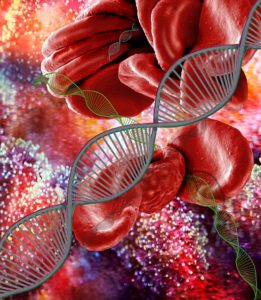Adeno-associated virus (AAV)-mediated gene therapy is a promising new treatment for hemophilia A which decreases bleeding and thus risk of transfusions for these patients, but little is known about the long-term efficacy of this treatment. As reported in The New England Journal of Medicine, a single dose of AAV5 with the SQ variant of human factor VIII transgene can be an effective treatment for hemophilia A up to three years later. A total of 15 adult male hemophilia A patients were given increasing doses of AAV5-hFVIII-SQ. The single patients in cohorts 1 and 2 who received 6×1012 vector genomes (vg) per kilogram and 2×1013 vg per kilogram, respectively, continued to have low factor VIII expression levels (below 1 IU per deciliter) during the three year trial. However, patients in cohort 3 (N=7) and cohort 4 (N=6) who received higher doses of AAV5-hFVIII-SQ (6×1013 vg per kilogram and 4×1013 vg per kilogram, respectively) had over 90% fewer bleeding events and completely stopped prophylactic factor VIII use over the three years of follow-up. No immune responses to factor VIII or the AAV5 capsid were observed, and only one serious adverse event, which quickly resolved, was attributed to the treatment. Follow-up of these patients is ongoing, and a larger clinical trial will further monitor the efficacy, safety, optimal dosing and additional variables related to treatment.
Reference:


It is a great success. Factor VIII Gene is very large, therefore, gene therapy was not effective in Hemophilia A. As a pediatric hematologist I am very glad to live in a century that for hemophilia A gene therapy will be available.